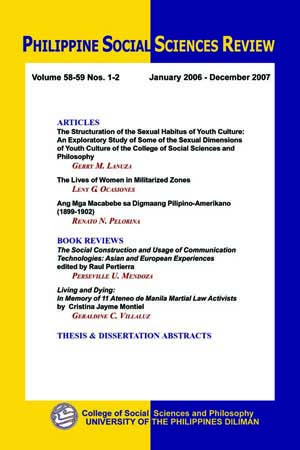Ang Mga Macabebe sa Digmaang Pilipino-Amerikano (1899-1902)
Abstract
The paper deals with the role played by the Macabebes as native soldiers used by the American military against the Filipino revolutionary forces during the Filipino-American War from 1899 to 1902. It has been the standard practice of any colonizing power to use native troops as auxiliary forces in many colonies to achieve its end. The Macabebes in the town of Macabebe, Pampanga were known to be very zealous in protecting their homeland by resisting the Spanish colonizers. But after their defeat by the superior military power, they made a one hundred eighty-degree turn and started serving the Spanish colonial government for more than three centuries. This turn of events was made possible by the Spaniards through the use of the elites of the town of Macabebe who acted as intermediaries between them and the common people. When Spanish colonization ended, the Macabebes who did not have any alliance with the Filipino revolutionaries shifted their loyalty to the Americans. Like the Spaniards, the Americans used the elites in the town of Macabebe in order to get the support of the common people for their cause. The people of this town had a patron-client relationship with these elites who were pro-American and controlled the politics and economy. In their campaign against the revolutionary forces during the Filipino-American War, they used the Macabebes as scouts, pontooniers, teamsters, camp followers, and guides in their military operations in order to cripple the last vestige of Filipino resistance. The employment of Macabebe Scouts in the American military campaign was a great success. The unbroken succession of elite influence since the Spanish period to the American regime made it possible for the American project of employing native troops for military service. The Macabebes who were merely farm workers (kasamak) of the landlords had seen soldiering as a source of their family’s income. A number of them joined, but this decision tarnished their reputation as a people. They were branded by their fellow Filipinos as stooges, collaborators, and traitors. These accusations, however, are unfair for the Macabebes. Their service to the American colonial government was largely a consequence of the elite influence in their town that had been controlling the politics and economy that marginalized them for a long period of time.___________
* Instructor of history at the Department of Social Sciences at the Cavite State University in Indang, Cavite. Email: renzpelorina@yahoo.com.
Published
2009-05-05
How to Cite
PELORINA*, Renato N..
Ang Mga Macabebe sa Digmaang Pilipino-Amerikano (1899-1902).
Philippine Social Sciences Review, [S.l.], v. 58, n. 1, may 2009.
ISSN 2672-3158.
Available at: <https://journals.upd.edu.ph/index.php/pssr/article/view/1270>. Date accessed: 20 aug. 2025.
Section
Articles
Keywords
macabebe; Philippine-American war


